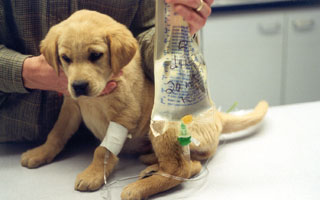San Pedro may be facing a potential Canine parvovirus (parvo) outbreak. According to the San Pedro Animal Hospital (SPAH), there has been an escalating number of positive parvo cases over the past six weeks. Parvo is a highly contagious viral disease that can produce a life threatening illness in puppies and dogs. While SPAH cannot identify the cause of the increase in number of infections, it believes that the virus has come to the island through the increasing number of puppies being brought over from the mainland.
According to Doctor of Veterinary Medicine (DVM) and co-owner of SPAH, Laurie Droke, the clinic has seen an alarming increase in parvo case this year. “While in a normal year the SPAH encounters two to three cases of Parvovirus, the number this year has already climbed to five times this amount. Over the past six weeks alone, ten cases have presented, with more expected to develop,” says Droke. The parvo virus attacks rapidly dividing cells in a dog’s body, mostly affecting the intestinal tract. Parvo also attacks the white blood cells, and in puppies, it can damage the heart muscle and cause lifelong cardiac problems.
Not only is the disease life-threatening, but it is also very contagious, and if kept unchecked, can spread across the island, endangering the lives of many pets. “It is hard to say why there is a sudden outbreak of this disease, but we believe that the high number of cases is coming from infected puppies being brought from the mainland. These puppies that people buy are not properly screened before being brought to the island and can carry disease that is not common here. As the number increases, Parvovirus is likely spreading between the dogs and puppies on the island,” said Droke.
Parvo can be transmitted by any person, animal or object that comes in contact with an infected dog’s feces. It is common for an unvaccinated dog to contract parvovirus from the streets, especially in urban areas where there are many strays. “This is very contagious and potentially fatal virus, especially for puppies. It can exist for a long time in the environment, and even a brief exposure to it is enough to make a puppy sick. Parvo attacks the gastrointestinal system, and the immune system of the puppy. The infection leads to serious dehydration and secondary infections by bacteria. Objects such as food bowls, shoes, clothes, carpet and floors can carry the disease,” said Droke.
Droke explained that some of the early signs of Parvo in pets are lethargy, severe vomiting, loss of appetite, and bloody, foul-smelling diarrhea. “Early treatment is the best chance the puppy can have for surviving. Delaying treatment by even two or three days very much reduces the puppy’s chances of survival. Proper vaccination is the most important method of protection owners can take. The Parvovirus is a portion of the DHLPP [(D) distemper, (H) hepatitis, (L) leptospirosis, (P) parainfluenza and (P) parvovirus] vaccine, which all puppies should be receiving. The first vaccine is usually given at six to eight weeks of age, and then repeated every three to four weeks until 15 weeks of age. The initial vaccines offer some protection, but puppies are not completely protected until they receive all the vaccines. This vaccine is then repeated yearly for the dog’s life span,” explained Droke.
In order to prevent your puppy from being infected, pet owners are encouraged to get them vaccinated as early as possible and to ensure they receive all their boosters. Until a puppy has received all his/her vaccines, the puppy should not be going to public places, and interacting with other potentially unvaccinated dogs, especially strays.
If your pet shows any signs of parvo, seek early treatment from a trained veterinarian. Parvo can only be diagnosed through laboratory blood testing. This disease calls for advanced medical treatment. A simple pill prescription cannot cure Canine parvovirus, and untreated cases carry a mortality rate of 91%.
Persons bringing dogs from areas outside of the island are urged to have them tested and properly vaccinated prior to their arrival to San Pedro. Only this can prevent the further spread of the disease and safeguard island pets.

Share
Read more

